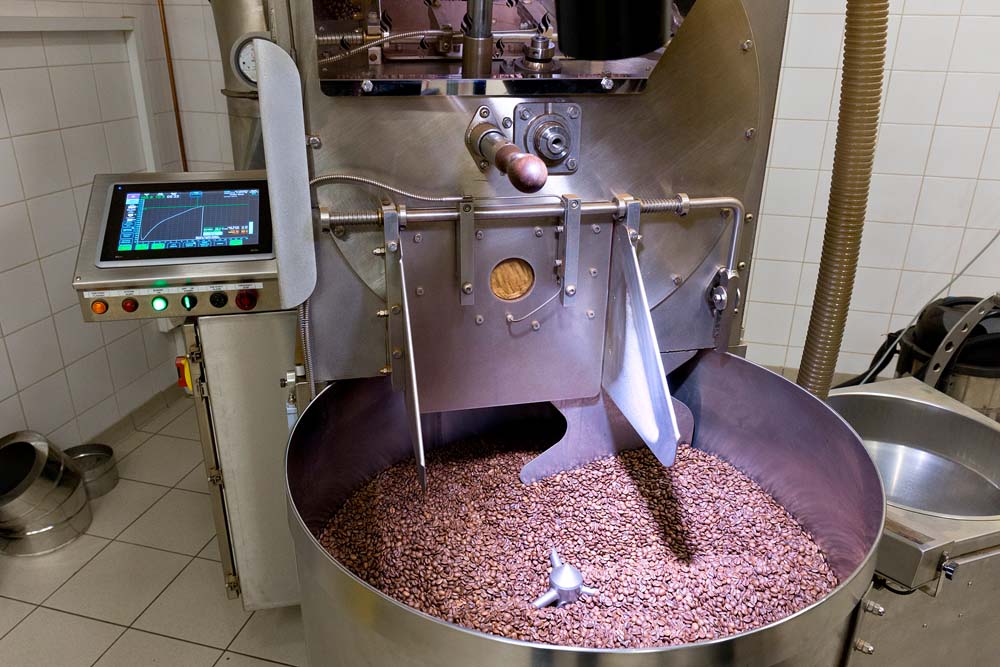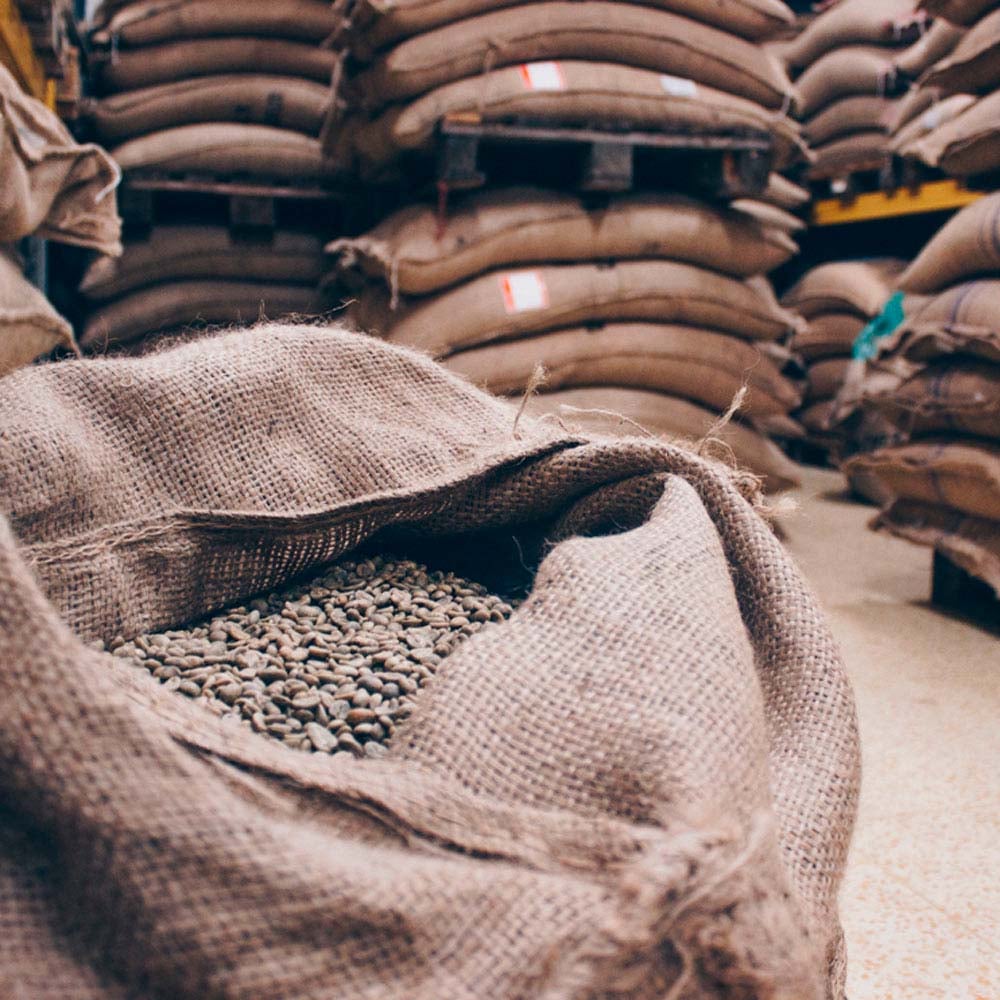

Coffee was added to OXALIS’ range in 1999, six years after the company was founded. We initially carried roasted coffee beans sourced from a firm called Balírny obchodu Praha, afterwards joined by commodity coffees from Mexico, Uganda, Brazil and India. Roasting duties were then handled outside of the Czech Republic. The focus was on dark roasts for the commodity or speciality beans, and any early roasting efforts by ourselves, so we still had a lot to learn.
The turning point came in 2010. Interest was beginning to be shown in the country in speciality coffee, an area OXALIS was also enthusiastically exploring. Cooperation commenced that year with a roastery in the Czech Republic, which took over the process of roasting according to our directions. Growth was seen in the segment and turnover skyrocketed. Clearly, though, the need to process coffee in-house was becoming a priority.
Upon recommendation, we were the first in the country to have a cutting-edge Loring Smart Merlinroaster, manufactured by an innovative American company. Although advanced in its technology, it was limited to handling 20 kg of green coffee, restricted by the capability to move a greater weight in the air chamber, while it was also somewhat noisy. When there was a need for higher output in volume, we upgraded to Loring Smart’s new Kestrel model with a maximum capacity of 35 kg per batch, which we use to this day.

Each type of coffee differs in roast profile, i.e. the way in which it’s roasted, varying on whether the intention is to produce coffee for eventual use on espresso or filter (or drip-coffee) equipment. To begin with, we concentrated on roasting beans for filter methods, meaning they were lightly roasted. Such lightness in roast allowed us to explore diverse options in the flavour of the resulting beans. It can’t be denied that the process of making filter coffee closely resembles that for tea.
We’ve moved on since then, to the extent that our roasting procedures are far more complex. Our finely-tuned roast profiles have expanded to encompass beans for espresso, whether purely from the arabica type or a blend of arabica and robusta. The pinnacle for us concerns the way we roast microlots in-house, these being exceptional and extremely limited batches of coffee.
The progress we’ve made in roasting has been recognised several times in independent tasting events. For example, OXALIS took part in an anonymous cupping contest in 2017, judged by leading national specialists, from which the ten best coffees were selected to go on to a prestigious Barista competition. Our coffee was selected to go through, proving we ranked amongst the ten best roasters in the Czech Republic.
Another sign of success is receipt of an award for coffee we supply to the Billa supermarket chain. In an independent consumer test of coffee from supermarkets by Dtest magazine in 2013, ours was awarded third place out of twenty-seven.
Billa requires that suppliers meet a very strict criterion expressed by the IFS (International Food Standard) certificate for foodstuffs. IFS certification includes ten “k.o. requirements”, which means the audit is immediately terminated in the case of any certain deficiencies, in addition to 250 other parameters. Achieving over 75% is considered successful, while the highest certificate is awarded at 95% and above. The audit takes place annually, and OXALIS has always been rated at an excellent level, exceeding this during the last certification at 97%.
The suppliers of coffee beans are selected very carefully, and we communicate with them directly. The coffee bought by OXALIS is thoroughly tested every year, and samples are always taken from the current harvest. We strive to keep the portfolio of suppliers stable, in the belief that long-term cooperation with proven growers leads to greater trust on both sides, better mutual understanding of quality standards and enhanced business conditions. Through maintaining long-lasting relationships with farmers, optimum conditions are created to support their activities with the aim of conducting mutually agreeable cooperation.

We roast about 120 tons of green coffee a year, which works out at 500 kg each day. It’s usually imported by the container, a quantity growers are familiar with and which promotes future collaboration. During the harvest, farmers invite us to visit the plantations to experience their processes and monitor quality, since climatic conditions vary each year and these can subtly alter the taste of the coffee. Direct, long-term suppliers are established in Brazil, Colombia, Peru, El Salvador, Costa Rica, Guatemala, Honduras, Panama, Ethiopia, Kenya, Uganda and India.
A farmer may choose to process a limited amount of coffee in an unusual way to bring out something unique in it. Exclusivity in quantity may also arise through use of a marginal, local coffee variety or one not typical for the given area; for example, cultivation of the Ethiopian variety of Geisha is spearheaded in Panama. Another factor is methodology; for instance, the honey method typical of areas with little water, such as Africa, is now practised elsewhere. Exceptional coffee resulting from non-standard processing methods or varieties is usually produced in a limited quantity, and this is referred to as a microlot. We endeavour to purchase outstanding examples to augment our range.
The roasting stage is where the art of the coffee master comes into play. While factors like the source of the coffee cherries, geography, climate and method of processing all affect the final product, the act of roasting beans - applying heat to them - is very individual. Literally, ten coffee masters could roast one type of coffee ten different ways. Everything is about the abilities of the person doing it, their intuition, experience and taste preferences. Sometimes this comes out in citrus tones, or the lightness of the drink. A trait typical of OXALIS coffee is sweetness .
Our Loring Smart roaster permits advanced control over all aspects of the roasting process, affording great consistency in the resultant taste. Boasting numerous sensors that react during operation, a powerful burner and innovative software, the unit can respond to the amount of coffee present (10kg to 35kg) and the inlet temperature, adjusting all parameters to give the desired roast profile.
We let the coffee stabilize after roasting, since transformation processes are still underway. It should ideally sit for 3-4 days for filter coffee and 12 days for espresso. Interestingly, freshly roasted coffee is hard to drink and odourless, so this time for transformation is needed.
Our coffee and tea can currently be bought ready to drink from two Teahouse & Coffee outlets run by OXALIS in the Czech Republic, where it’s precisely prepared to the highest standards. One is in the spa town of Luhačovice on the colonnade, while the other is on Vodičková Street in central Prague. Coffee is offered as espresso and all variations on this with milk, made on premium la Marzocco espresso machines, or by alternative methods (French press, V60 or filter).
